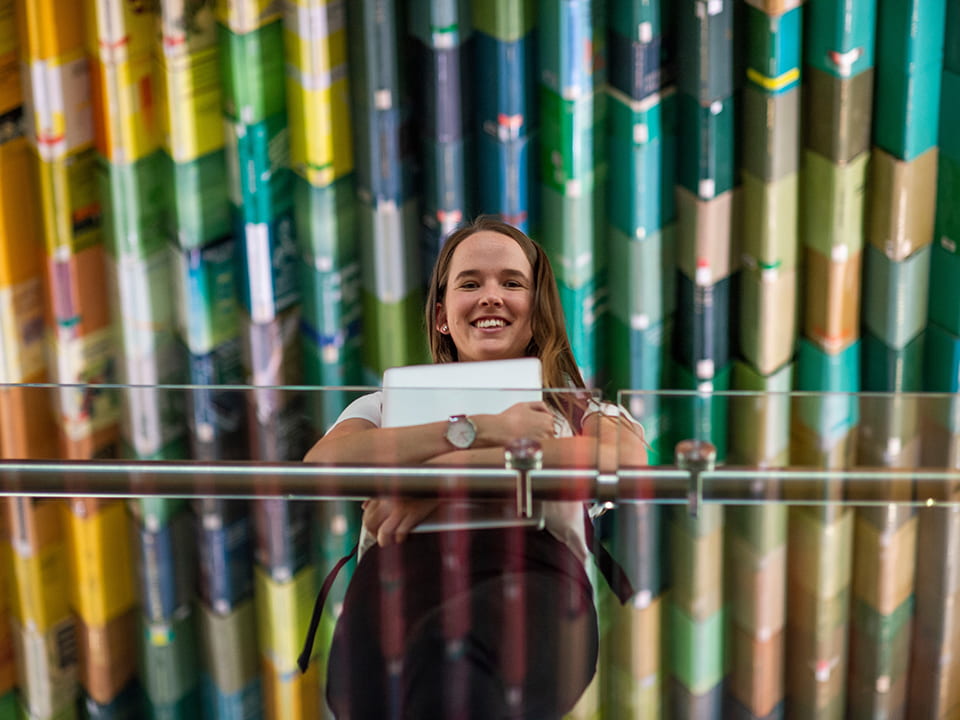
Your research space
As a full-time research student, you’ll have access to everything you need to create a productive and successful research environment. This includes:
- an office space with access to a desk, computer, photocopying facilities and relaxation spaces
- any tools and software you need to conduct your research
- laboratory or studio space, including equipment and facilities
- access to all facilities and services on campus.
You'll also have access to specialised resources and support through the faculty or school you're researching with.
Advanced technology
We’re developing advanced technologies that allow transdisciplinary teams to collaborate across global boundaries.
You’ll access advanced information technology to create and analyse research data, developing your research design and supporting academic publishing.
All this will be supported by our high performance computing and advanced technologies, exceptional library infrastructure, and information technology services.
Take advantage of our leadership in research technology, including:
- ePrints, our large academic publications database
- high performance computing and visualisation facilities
- international exposure for your research through our digital repository.

Scholarly communication and library services
QUT’s Office for Scholarly Communication (OSC) provides advice, infrastructure and tools to make our researchers’ findings accessible to the world.
The OSC:
- manages core scholarly communication services including copyright
- supports curation and access to research data
- provides assistance with author profiles and publication metrics
- facilitates information research skills training for research students
- provides a suite of workshops and training opportunities for researchers and academic staff.
We offer consultation services and research skills training to help you develop the information management and research skills you need to succeed in your study.
Showcasing our research
QUT is a leader in open access, having developed the world’s first institutional open access policy in 2003.
Today, the OSC supports QUT ePrints, our institutional repository which showcases the research output of our staff and postgraduate students. It also hosts QUT eJournals, with open access, peer-reviewed, scholarly journals on a diverse array of topics.
Curation and access to our research data is supported by QUT Research Data Finder, increasing the accessibility, reach and impact of QUT's research.
The OSC is situated within the QUT Library and the services are supported in collaboration with Liaison Librarians.

Transformative research training
QUT's Graduate Research Education and Development offers a transformative new approach to the research training environment by giving you a personalised learning journey throughout your research journey. You’ll be able to choose experiences and opportunities that will strengthen your innovative, industry-relevant, transdisciplinary and professional practices.
You’ll have access to:
- QUT's innovative digital HDR Skills Assessment tool
- bespoke online resources for information, education and peer-to-peer discussions
- face-to-face workshops and events to support candidature requirements and research skills
- online modules to develop skills in entrepreneurship, commercialisation, leadership, project management and career development via the e-Grad School
- learning environments to develop skills in transdisciplinary practices and career progression
- mentoring programs with industry experts and alumni
- practical placements in industry and end-user environments
- coursework and training resources to help you build skills in research practices, academic writing, IT literacy and research methodologies
- modules and training resources for early career alumni.

International experiences
We’ll encourage and support you to pursue international experience and opportunities, including:
- attending conferences
- taking field trips to conduct research
- working with visiting international experts.
You may also need to travel to:
- access special equipment
- consult certain archives relevant to your research
- do field research.
Research at QUT on exchange
We welcome research students from all over the world to complete part of their studies with us. Research with us on exchange.
Career preparation
We offer optional skills and professional development opportunities that take into account your pre-existing professional experiences and skills, and prepare you for diverse career paths and goals. As a QUT research student you'll:
- demonstrate your ability to independently develop a body of work through your thesis and published papers
- develop a broad range of skills to prepare you for careers in industry, government, academia, or the community
- have access to our ePortfolio software, which profiles your work to prospective employers
- be provided with a statement of your completed optional training.
Support after graduation
For the first three years after you've completed your PhD, we'll give you extra support to help you transition to your postgraduate career. Our alumni have access to all sorts of benefits and special offers.
You'll have access to opportunities for networking, as well as continued access to your QUT email, and select library resources and workshops.
We can give you advice on grant-writing and funding opportunities. We'll also connect you with QUT Creative Enterprise Australia.
You'll have the full support of our employment and careers service, as well as access to workshops and resources through our human resources department.
To help you kickstart your career in academia, you can also apply for the three-year QMomentum fellowship, where you'll get access to extensive support and services to help you research and publish after graduation. You may also be included in our annual Research Graduates Yearbook.
Nominate to be a visiting fellow
The Academic Division invites Doctoral Graduates to nominate for a visiting fellow position. A fellowship would stand for two years and gives you access to a range of support and services.
When submitting a nomination, please discuss your intention with your supervisor. You can submit an application by emailing the following to hdr@qut.edu.au:
- your CV which should include your email address, mobile number and postal address
- an email of support from your supervisor
- a statement of the work you intend to undertake during the fellowship period.
Nominations will be considered by the Senior Deputy Vice-Chancellor and Vice President (Research).